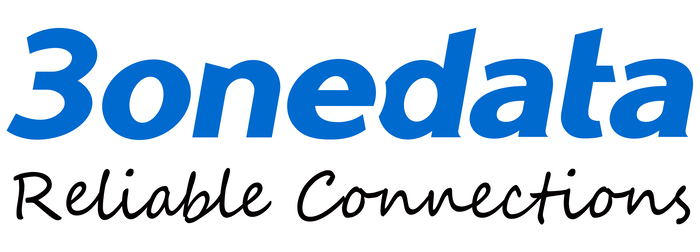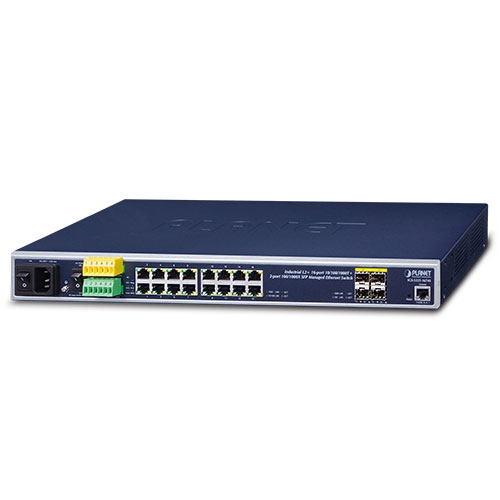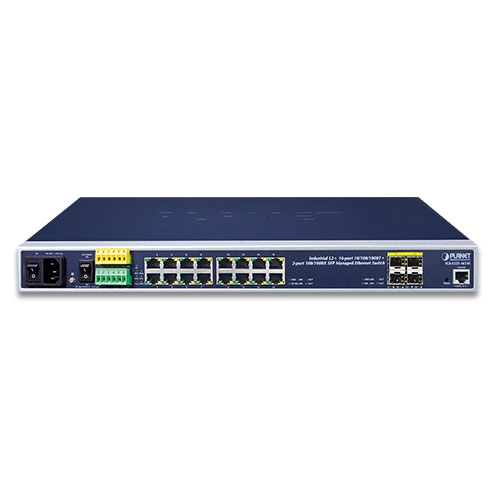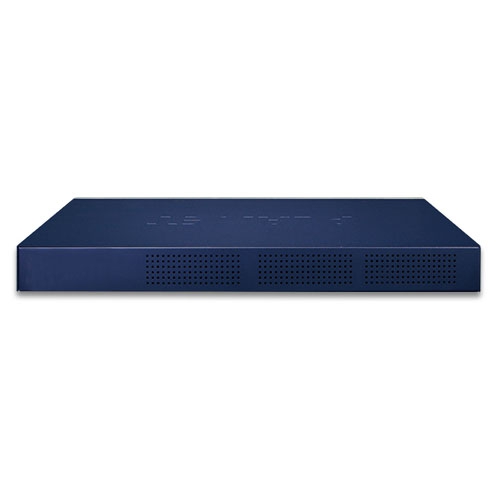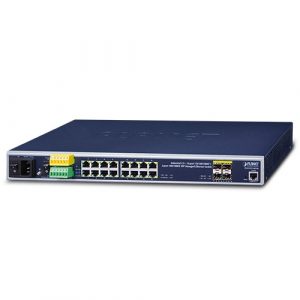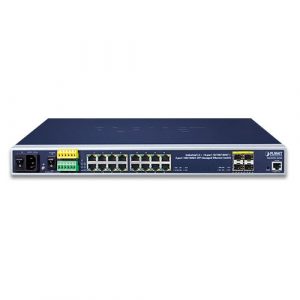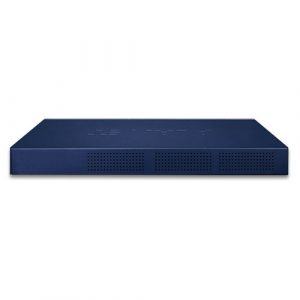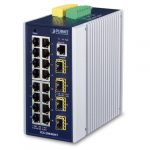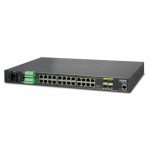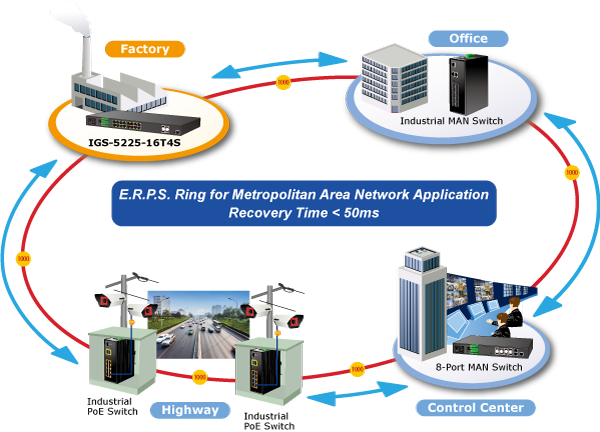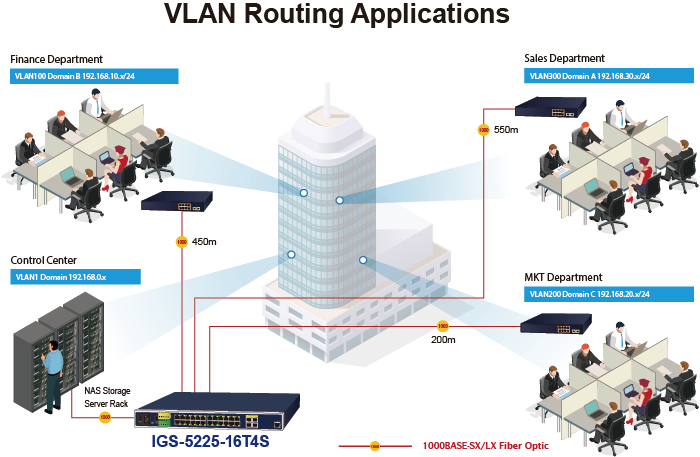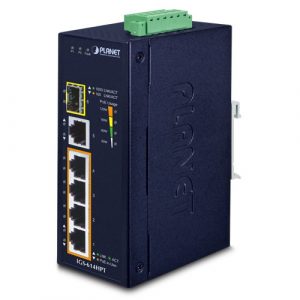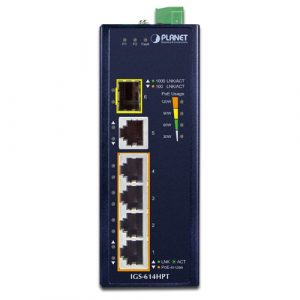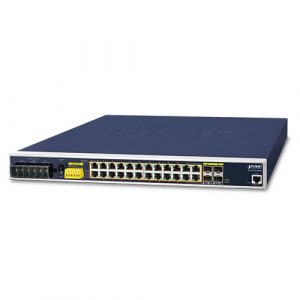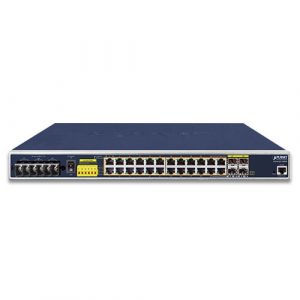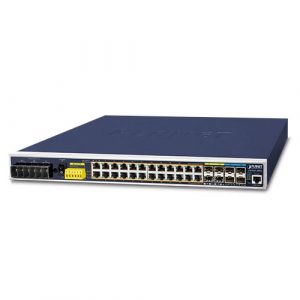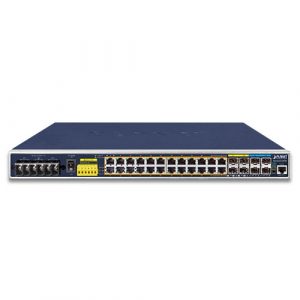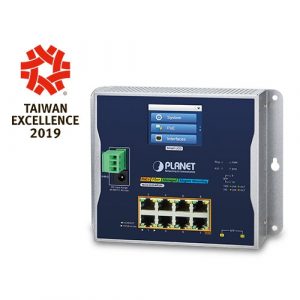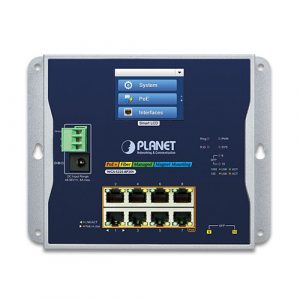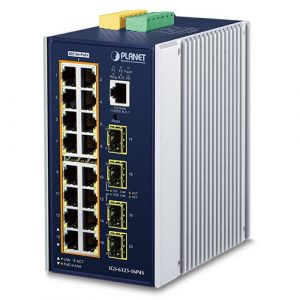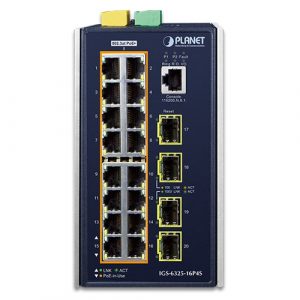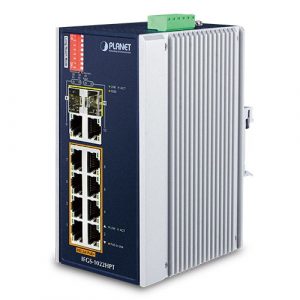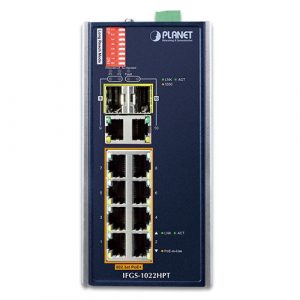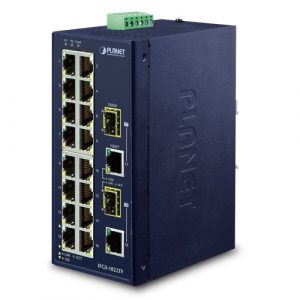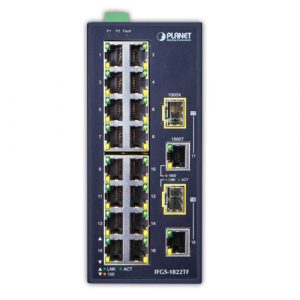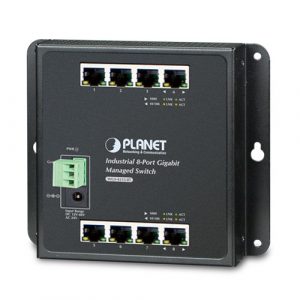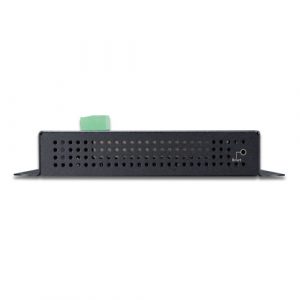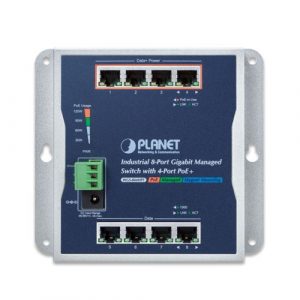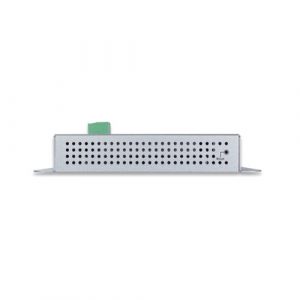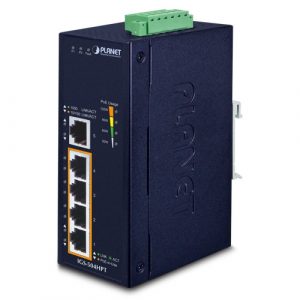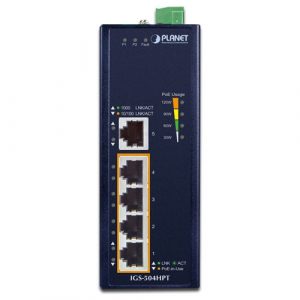IGS-5225-16T4S
IP30 19″ Rack Mountable Industrial L2+/L4 Managed Ethernet Switch, 16*1000T + 4*100/1000X SFP (-40 – 75 C, AC Power 30W Incluso+ 2 DC 36-60V, DIDO Optional), ERPS Ring Supported, 1588
- Applicazioni
- SPECIFICHE
- DOWNLOAD
Descrizione
Switch gestito per reti industriali e di automazione
PLANET IGS-5225-16T4S, uno switch Gigabit gestito Layer 2+ industriale, è dotato di 16 porte 10/100/1000Mbps e 4 porte SFP 100/1000X e supporta il routing statico Layer 3 in un case 1U. Con una struttura di commutazione totale di 40 Gbps, l’IGS-5225-16T4S può gestire grandi quantità di dati in una topologia sicura che si collega a un backbone industriale o a server ad alta capacità. L’IGS-5225-16T4S è in grado di fornire una struttura di commutazione non bloccante e una velocità di trasmissione dati wire-speed nell’intervallo di temperatura da -40 a 75 gradi C senza alcuna perdita di pacchetti ed errore CRC. Semplifica notevolmente le attività di aggiornamento della LAN industriale per soddisfare le crescenti richieste di larghezza di banda. Inoltre, adotta un design “Front Access” intuitivo per un cablaggio e una manutenzione semplici dell’IGS-5225-16T4S quando posizionato nell’armadio.
Anello ridondante, Recupero Rapido per Applicazioni di rete critiche
IGS-5225-16T4S supporta la tecnologia ad anello ridondante e dispone di una forte e rapida capacità di auto-recupero per prevenire interruzioni del servizio e intrusioni esterne. Incorpora la tecnologia avanzata ITU-T G.8032 ERPS (Ethernet Ring Protection Switching), il protocollo Spanning Tree (MSTP 802.1s) e il sistema di alimentazione ridondante nella rete di automazione industriale del cliente per migliorare l’affidabilità del sistema e il tempo di attività in ambienti industriali difficili. In una determinata rete ad anello semplice, il tempo di recupero del collegamento dati può arrivare a 20 ms.
Applicazione Layer 3 VLAN Routing
IGS-5225-16T4S integra robusti protocolli di routing Layer 3, garantendo un routing affidabile tra le VLAN e segmenti di rete. I protocolli di routing possono essere applicati dall’interfaccia VLAN con fino a 32 voci di routing. Questo switch è sicuramente una soluzione ideale per le industrie, offrendo maggiore sicurezza, controllo e conservazione della larghezza di banda e uplink ad alta velocità.
| Hardware Specifications | |
|---|---|
| Copper Ports | 16 10/100/1000BASE-T RJ45 auto-MDI/MDI-X ports |
| SFP/mini-GBIC Slots | 4 100/1000BASE-X SFP interfaces Compatible with 100BASE-FX SFP transceiver |
| Console | 1 x RS232-to-RJ45 serial port (115200, 8, N, 1) |
| Switch Architecture | Store-and-Forward |
| Switch Fabric | 40Gbps/non-blocking |
| Throughput | 29.76Mpps@64Bytes |
| Address Table | 8K entries, automatic source address learning and aging |
| Shared Data Buffer | 4M bits |
| Flow Control | IEEE 802.3x pause frame for full-duplex Back pressure for half-duplex |
| Jumbo Frame | 9K bytes |
| Reset Button | < 5 sec: System reboot > 5 sec: Factory default |
| Dimensions (W x D x H) | 440 x 200 x 44.5 mm, 1U height |
| Weight | 2672g |
| LED | System: AC (Green), DC1 (Green), DC2 (Green), Fault ( Red ) Ring (Green), R.O. (Green), DI/DO ( Red ) 10/100/1000T RJ45 Interfaces (Port 1 to Port 16): 1000Mbps LNK/ACT (Green) 10/100Mbps LNK/ACT (Orange) 100/1000Mbps SFP Interfaces (Port 17 to Port 20): 1000Mbps LNK/ACT (Green) 100Mbps LNK/ACT (Orange) |
| Power Consumption | Max. 15.2 watts/51.8 BTU |
| Power Requirements – AC | AC 100~240V, 50/60Hz 0.4A |
| Power Requirements – DC | DC 36~60V, 0.6A |
| DI/DO | 2 Digital Input (DI): Level 0: -24~2.1V Level 1: 2.1~24V Max. input current: 10mA 2 Digital Output (DO): Open collector to 24VDC, 100mA |
| ESD Protection | 6KV DC |
| Layer 2 Management Functions | |
| Port Configuration | Port disable/enable Auto-negotiation 10/100/1000Mbps full and half duplex mode selection Flow control disable/enable |
| Port Status | Display each port’s speed duplex mode, link status, flow control status, auto-negotiation status, trunk status |
| Port Mirroring | TX/RX/Both Many-to-1 monitor |
| VLAN | 802.1Q tagged based VLAN Q-in-Q tunneling Private VLAN Edge (PVE) MAC-based VLAN Protocol-based VLAN Voice VLAN IP subnet-based VLAN MVR (Multicast VLAN registration) Up to 255 VLAN groups, out of 4095 VLAN IDs |
| Link Aggregation | IEEE 802.3ad LACP/static trunk 10 groups with 8 port per trunk |
| Spanning Tree Protocol | IEEE 802.1D Spanning Tree Protocol (STP) IEEE 802.1w Rapid Spanning Tree Protocol (RSTP) IEEE 802.1s Multiple Spanning Tree Protocol (MSTP) |
| QoS | Traffic classification based, strict priority and WRR 8-level priority for switching: – Port number – 802.1p priority – 802.1Q VLAN tag – DSCP/ToS field in IP packet |
| IGMP Snooping | IGMP (v1/v2/v3) snooping, up to 255 multicast groups IGMP querier mode support |
| MLD Snooping | MLD (v1/v2) snooping, up to 255 multicast groups MLD querier mode support |
| Access Control List | IP-based ACL/MAC-based ACL Up to 256 entries |
| Bandwidth Control | Per port bandwidth control Ingress: 100Kbps~1000Mbps Egress: 100Kbps~1000Mbps |
| Layer 3 Functions | |
| IP Interfaces | Max. 8 VLAN interfaces |
| Routing Table | Max. 32 routing entries |
| Routing Protocols | IPv4 software static routing IPv6 software static routing |
| Management | |
| Basic Management Interfaces | Console/Telnet/Web browser/SNMP v1, v2c |
| Secure Management Interfaces | SSH, SSL, SNMP v3 |
| SNMP MIBs | RFC 1213 MIB-II RFC 1493 Bridge MIB RFC 1643 Ethernet MIB RFC 2863 Interface MIB RFC 2665 Ether-Like MIB RFC 2819 RMON MIB (Group 1, 2, 3 and 9) RFC 2737 Entity MIB RFC 2618 RADIUS Client MIB RFC 2863 IF-MIB RFC 2933 IGMP-STD-MIB RFC 3411 SNMP-Frameworks-MIB RFC 4292 IP Forward MIB RFC 4293 IP MIB RFC 4836 MAU-MIB IEEE 802.1X PAE LLDP |
| Standards Conformance | |
| Regulatory Compliance | FCC Part 15 Class A, CE |
| Standards Compliance | IEEE 802.3 10BASE-T IEEE 802.3u 100BASE-TX/100BASE-FX IEEE 802.3z Gigabit SX/LX IEEE 802.3ab Gigabit 1000T IEEE 802.3x flow control and back pressure IEEE 802.3ad port trunk with LACP IEEE 802.1D Spanning Tree Protocol IEEE 802.1w Rapid Spanning Tree Protocol IEEE 802.1s Multiple Spanning Tree Protocol IEEE 802.1p Class of Service IEEE 802.1Q VLAN tagging IEEE 802.1x Port Authentication Network Control IEEE 802.1ab LLDP IEEE 1588v2 RFC 768 UDP RFC 793 TFTP RFC 791 IP RFC 792 ICMP RFC 2068 HTTP RFC 1112 IGMP v1 RFC 2236 IGMP v2 RFC 3376 IGMP v3 RFC 2710 MLD v1 FRC 3810 MLD v2 |
| Environment | |
| Operating | Temperature: -10 ~ 60 degrees C for AC power input Temperature: -40 ~ 75 degrees C for DC power input Relative Humidity: 5 ~ 95% (non-condensing) |
| Storage | Temperature: -40 ~ 80 degrees C Relative Humidity: 5 ~ 95% (non-condensing) |


